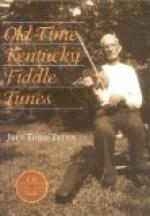As he looked at her, now, he for the first time fully realized her beauty. He had known, from the first, that she was most attractive, most unusual for a mountain maid; but now, laughing, although her head was still bent to the book, her big eyes, sparkling with her merriment, raised frankly to his face, were revelations to him. He had not seen such eyes before, and all the old-time similes for deep-brown orbs sprang instantly to mind. “Fathomless pools,” “translucent amber”—no simile would really describe them. Late hours had never dimmed them, illness had never made them heavy, he was sure a lie had never made them shift from their straight gaze for one short second. He had not seen such eyes in cities!
And from careful contemplation of the eyes, he kept on with a careful contemplation of the other beauties of his fair and unexpected pupil. Her homespun gown, always ill-shaped and now unusually protuberant in spots, unusually tight in others, because of its late wetting and impromptu, partial drying, could not hide the sylvan grave of her small-boned and lissome figure, just budding into womanhood. Her feet, crossed on the ground, were as patrician in their nakedness as any bluegrass belle’s in satin slippers. Her ankles, scratched by casual thorns and already beginning to blush brown from the June sun’s ardent kisses, were as delicate as any he had ever seen enmeshed in silken hose. Her hands, long, slender, taper-fingered, actually dainty, although brown and roughened by hard labor, were, it seemed to him, better fitted for the fingering of a piano’s keys than for the coarse and heavy tasks to which he knew they must be well accustomed. He gazed at her in veritable wonder. How had she blossomed, thus, here in this wilderness?
“Where do you live?” he asked, interrupting their scholastic efforts.
“Up thar,” she pointed, and, above, he could just see the top of a mud-and-stick chimney rise above a crag between the trees.
“Have you brothers or sisters?”
“Ain’t got nobody,” she answered, and to her face there came a look of keen resentment rather than of sorrow or of resignation. “I’m all th’ feud left,” she said simply. She looked at Layson quickly, wondering if he would be surprised that she should not have fought and also died. “Girl cain’t fight alone, much,” she went on, in hurried explanation, or, rather, quick excuse. “I might take a shot if I should git a chanst, but I ain’t had none, an’, besides, I guess it air plum wrong to kill, even if there’s blood scores to be settled up. I toted ’round a rifle with me till last fall, but then I give it up. They won’t git me—but maybe you don’t know what feuds are in the mountings, here.”
He was looking at her with new interest. All his life he had heard much about the dreadful mountain feuds. As the bogey-man is used in Eastern nurseries, so are the mountaineers used in the nurseries of old Kentucky and of Tennessee to frighten children with. Their family fights, not less persistent or less deadly than the enmities between the warring barons of the Rhine in middle ages, form a magnificent foundation for dire tales.




